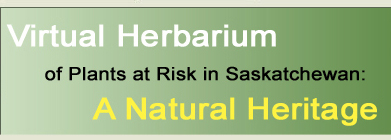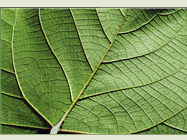|
| Chenopodium incanum
(S. Wats.) Heller |
|
| |
| TAXONOMY |
| |
| Family: |
Chenopodiaceae |
| Genus: |
Chenopodium |
| |
| Species Synonyms: |
none |
| Common Names: |
mealy goosefoot
hoary goosefoot |
| |
| DISTRIBUTION |
| |
| Canada: |
southeastern Alberta – southwestern Saskatchewan |
| Saskatchewan: |
southwestern Saskatchewan; Merryflat – Saskatoon |
| Ecoregion: |
Cypress Upland, Mixed Grassland, Moist Mixed Grassland |
| |
| HABITAT |
| |
| Saskatchewan: |
open, clayey grasslands and
barrens |
| |
| RARITY STATUS |
| |
Provincial
Status According
to Harms (2003): |
Threatened |
| Nature Conservancy
Status: |
G5 S1 |
Saskatchewan
Species at
Risk Status: |
None |
| COSEWIC Status:
|
None |
| |
| Chenopodium
incanum is threatened in Saskatchewan because it is extremely rare
and somewhat regionally restricted. |
| |
| SPECIES
DESCRIPTION |
| |
| Height: |
< 25 cm |
| Roots: |
taproot slender |
| Stems: |
annual, erect or ascending, often branched from
base, densely farinose throughout, striate |
| Leaves: |
alternate, petiolate, blade 7 – 15 mm long,
about as wide as long, lower leaves deltoid to rhombic, light green, farinose,
basal teeth sharp |
| Inflorescence: |
glomerules congested into spikes, then in terminal
or axillary panicles |
| Flowers: |
sepals 5, densely to moderately farinose; corolla
0, stamens 5; stigmas 2 |
| Fruits: |
perianth covering seeds at maturity; pericarp
appearing smooth, non-adherent; seeds <1.5 mm, horizontal, black, smooth,
shining |
| |
| CHENOPODIUM
KEY FOR SPECIES FOUND IN SASKATCHEWAN |
| |
| 1 Flowers in globose heads (then in
spikes); calyx fleshy and bright red in fruit, appearing berry-like |
C. capitatum |
| 1 Flowers in glomerules (then in spikes);
calyx not fleshy and bright red in fruit, not appearing berry-like |
2 |
| |
|
2 Sepals 3; fruits vertical and occasionally
horizontal in the same inflorescence
|
3 |
| 2 Sepals 5; fruits horizontal |
4 |
| |
|
| 3 Leaves densely white farinose beneath,
2 – 3 cm long; calyx greenish; plants of saline soil |
C. glaucum var. salinum |
| 3 Leaves glabrous or nearly so beneath,
3 – 10 cm long; calyx becoming reddish with age; plants of lakeshores
and dried sloughs |
C. rubrum |
| |
|
| 4 Leaves with one vein from base |
5 |
| 4 Leaves with three or more veins
from base |
6 |
| |
|
| 5 Plants nearly glabrous; pericarp
easily separated from seed |
C. subglabrum |
| 5 Plants farinose; pericarp attached
to seed |
C. leptophyllum |
| |
|
| 6 Leaves linear to narrowly lanceolate,
1 – 5 times longer than wide, < 1.5 cm wide |
7 |
| 6 Leaves rhombic to broadly lanceolate,
1 – 3 times longer than wide, usually > 1.5 cm wide |
11 |
| |
|
| 7 Calyx lobes covering seed at maturity
|
C. dessicatum |
| 7 Calyx lobes not covering seed at
maturity |
8 |
| |
|
| 8 Fruit an achene, pericarp attached
|
9 |
| 8 Fruit a utricle, pericarp separable
|
10 |
| |
|
| 9 Leaves three times longer than broad
or longer, elliptic to narrowly lanceolate |
C. hians |
| 9 Leaves 2 – 3 times longer
than broad or less, narrowly oblong to rhombic |
C. strictum var. glaucum |
| |
|
| 10 Primary leaves with one or two
lobes or teeth above base; plants erect |
C. pratericola |
| 10 Primary leaves entire or with basal
lobes; plants open and branched |
C. atrovirens |
| |
|
| 11 Leaves bright green, base truncate
to cordate; seeds larger than 1.5 mm |
C. simplex |
| 11 Leaves light green, at least below,
base not truncate or cordate; seeds smaller than 1.5 mm |
12 |
| |
|
| 12 Fruits appearing honey-combed on
surface |
13 |
| 12 Fruits appearing smooth on surface
|
14 |
| |
|
| 13 Pericarp white at maturity; odour
of dead fish |
C. watsonii |
| 13 Pericarp translucent at maturity;
no odour of dead fish |
C. berlandieri |
| |
|
| 14 Lower leaves toothed above base,
never entire or with only basal lobes or teeth |
C. album |
| 14 Lower leaves entire above base,
may have 1 or 2 lobes or teeth at base |
15 |
| |
|
| 15 Calyx covering fruit at maturity;
fruits approximately 1 mm; plants usually less than 50 cm tall; densely
farinose throughout |
C. incanum |
| 15 Calyx not covering fruit at maturity;
fruits slightly larger than 1 mm (to 1.5 mm); plants commonly over 50 cm
tall at full maturity; farinose on upper surface of leaves and in inflorescence |
C. fremontii var. fremontii |
|






